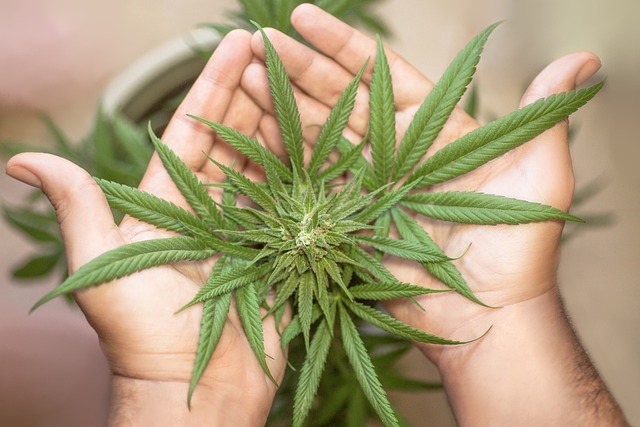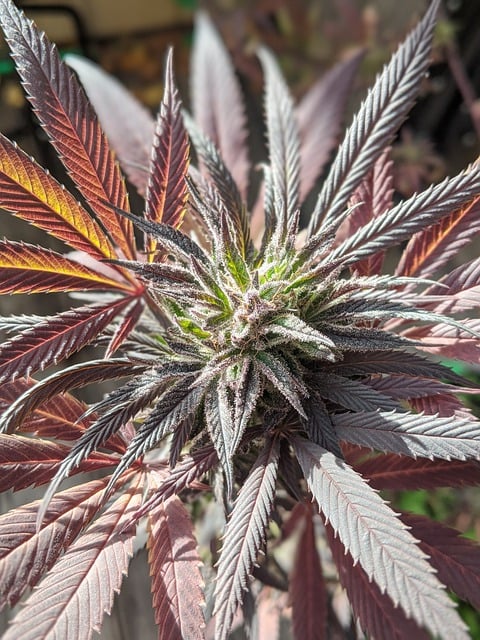The THCA flower, containing non-psychoactive THCA, is gaining attention in the wellness sphere for its therapeutic benefits without the high associated with THC. Rich in CBD and terpenes, it leverages an 'entourage effect' to potentially offer pain relief, anxiety reduction, and anti-inflammatory effects. Scientific research indicates that THCA interacts with the endocannabinoid system by binding to CB1 and CB2 receptors, offering health advantages such as anti-nausea properties, antiemetic effects, and neuroprotective benefits. This makes it a promising addition to natural health practices, particularly when combined with CBD and terpenes, which can enhance its therapeutic potential in managing conditions like arthritis and neurological disorders. As research progresses, the role of THCA as a key component in cannabis flowers alongside CBD and terpenes becomes increasingly evident, highlighting its significant contribution to the therapeutic landscape of cannabis-based treatments.
Discover the multifaceted wellness benefits of THCA (Tetrahydrocannabinolic Acid) flower, a non-psychoactive cannabinoid gaining attention for its potential health applications. This article delves into the science of THCA and how it interacts with our bodies, highlighting its advantages over traditional psychoactive cannabis products. Explore the entourage effect of THCA in conjunction with CBD and terpenes, and learn how this natural compound can be a valuable addition to your health regimen. From pain relief to neuroprotective properties, the therapeutic potential of THCA flower is under scrutiny, offering a promising alternative for those seeking holistic wellness solutions. Join us as we navigate the legal considerations, cultivation tips, and future research directions surrounding this emerging treatment option.
- Unveiling the Potential of THCA Flower: An Overview
- The Science Behind THCA and Its Health Implications
Unveiling the Potential of THCA Flower: An Overview

Unveiling the potential of THCA (Tetrahydrocannabinolic Acid) flower, we delve into the emergent benefits that this natural compound holds. Unlike its psychoactive counterpart THC, THCA exists in raw cannabis and hemp plants before decay or heat degrade it into THC. This precursor to THC offers a unique set of properties that are gaining attention in wellness circles for its potential health benefits. The THCA flower contains high concentrations of this non-psychoactive cannabinoid, which, when consumed, interacts with the body’s endocannabinoid system. This interaction may offer therapeutic effects without the traditional ‘high’ associated with THC.
One of the most compelling aspects of THCA flower is its synergy with CBD (cannabidiol) and terpenes. When these compounds are present together, they can create an entourage effect, enhancing each other’s therapeutic properties. Terpenes, the aromatic compounds found in cannabis, not only contribute to its distinctive flavor profiles but also may modulate the effects of THCA and CBD, potentially increasing their efficacy. This synergy is believed to provide a broader spectrum of benefits, which may include pain relief, anti-inflammatory properties, anxiety reduction, and more. As research continues to unfold, the therapeutic potential of THCA flower in conjunction with CBD and terpenes becomes increasingly clear, offering a promising alternative for individuals seeking natural wellness solutions.
The Science Behind THCA and Its Health Implications

delta-9-tetrahydrocannabinolic acid (THCA) is the non-psychoactive precursor to the well-known compound delta-9-tetrahydrocannabinol (THC), found abundantly in cannabis flowers. Scientific research indicates that THCA possesses a range of potential health benefits, largely due to its interaction with the body’s endocannabinoid system. This system plays a crucial role in regulating various physiological processes including appetite, pain-sensation, mood, and memory. THCA is believed to exert its effects by binding to the cannabinoid receptors, particularly CB1 and CB2, without the psychoactive side effects associated with THC.
The health implications of THCA are further enhanced when considering its synergy with other cannabinoids, terpenes, and flavonoids found in cannabis flowers. Specifically, CBD (cannabidiol) and terpenes contribute to what is known as the ‘entourage effect,’ where the combined effects of all the compounds present in the plant are greater than any single compound alone. This synergy can potentially enhance the health benefits of THCA. For instance, studies suggest that THCA may have anti-inflammatory and neuroprotective properties, which could be beneficial in managing conditions like arthritis or neurological disorders. The potential therapeutic applications of THCA are vast, ranging from anti-nausea effects to promising antiemetic properties. Additionally, the synergy with CBD can modulate the psychoactive effects of THC, offering a more balanced and beneficial experience for medical use. As research continues to evolve, the understanding of THCA’s role in health and wellness becomes clearer, highlighting its potential as a key player in the cannabis therapeutic landscape.
THCA flower, a non-psychoactive cannabinoid precursor to THC, presents a promising landscape for health and wellness. The science surrounding its benefits reveals potential for supporting various aspects of health due to its unique composition and interaction with the body’s endocannabinoid system. When paired with CBD and the entourage effect of terpenes, THCA flower showcases a synergistic relationship that could enhance overall well-being. As research continues to evolve, the significance of this natural compound becomes increasingly clear, offering a compelling alternative for those seeking the potential health benefits associated with cannabis without the psychoactive effects.
